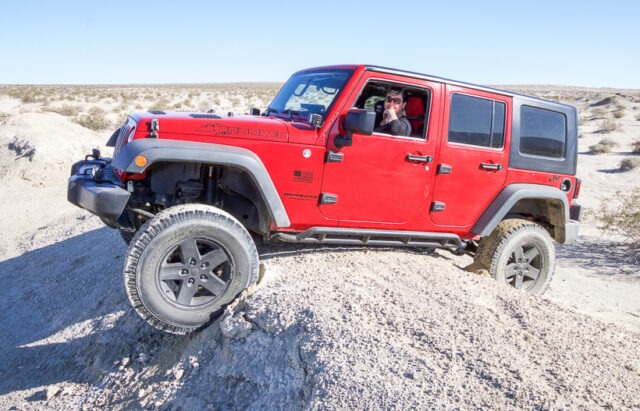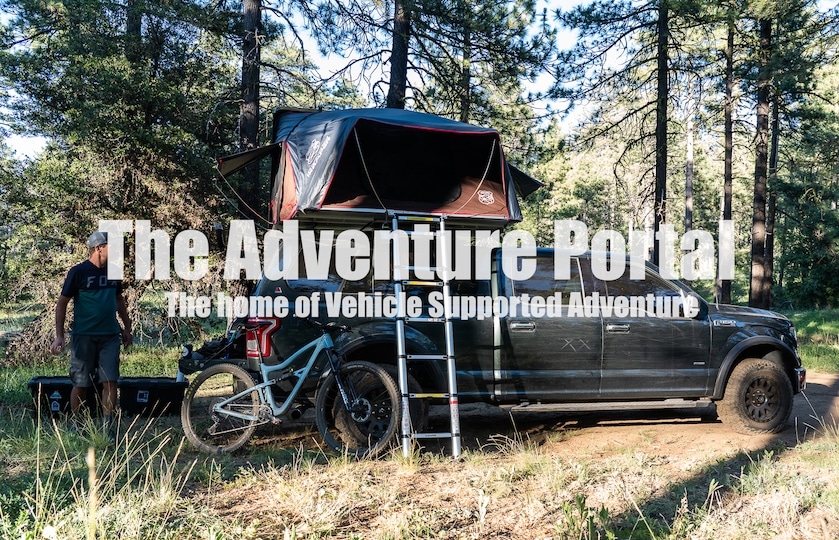TAP Editor’s Note: The following is part two of a three-part series on off-road recovery. The author, Bob Wohlers, teaches government, corporate, and recreational off-roading as a full time profession. He is one of only a handful of fulltime 4WD trainers in the USA. Some of the content in this multi-part series comes from Bob’s book The Total Approach to Getting Unstuck Off Road – 4WD Self-Recovery & Vehicle-Assisted Recovery. While other authors of 4WD books try to cover the topic of recovery in a single chapter, Bob has the only complete book on the topic – 352 pages of step-by-step information.
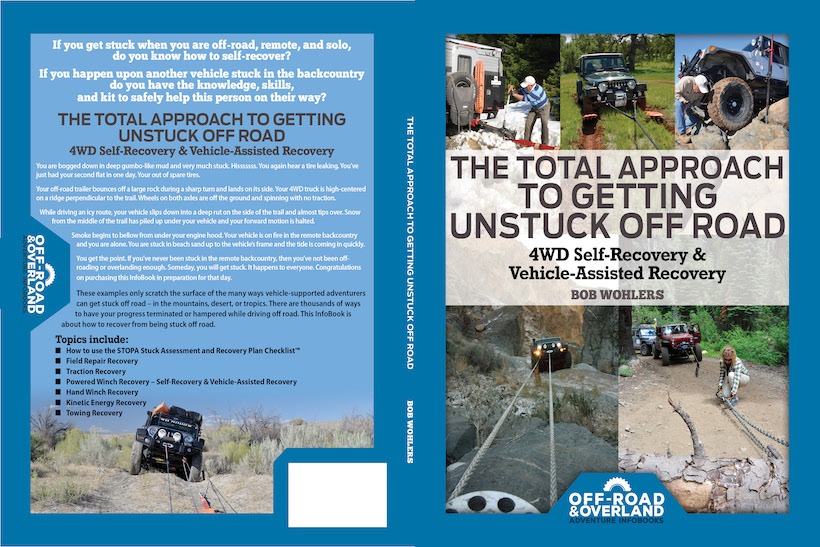
This book can be easily purchased on Amazon by clicking HERE. Bob also has two other 4WD specific books available on Amazon, each designed to help protect people, vehicles, and the environment: (1) Raising Your 4WD vehicle Off Road & In-Field Tire Repair (2) Live Long to Wander – Basic Survival for Vehicle-Supported Adventures To learn more about Bob Wohler, visit his website www.DiscoverOffRoading.com.
There’s No Embarrassment in Getting Stuck Off-Road
If You…
As I tell my all of my students, “Off-Road long enough and you will get stuck in the remote backcountry.” Prepare for that day, then prepare some more – with knowledge, skills, and off-road recovery equipment that you should carry along on your journeys.” What can happen? Here’s some possibilities:
- You get bogged down in deep, greasy, gumbo-like mud; one wheel from each axle begins to spin.
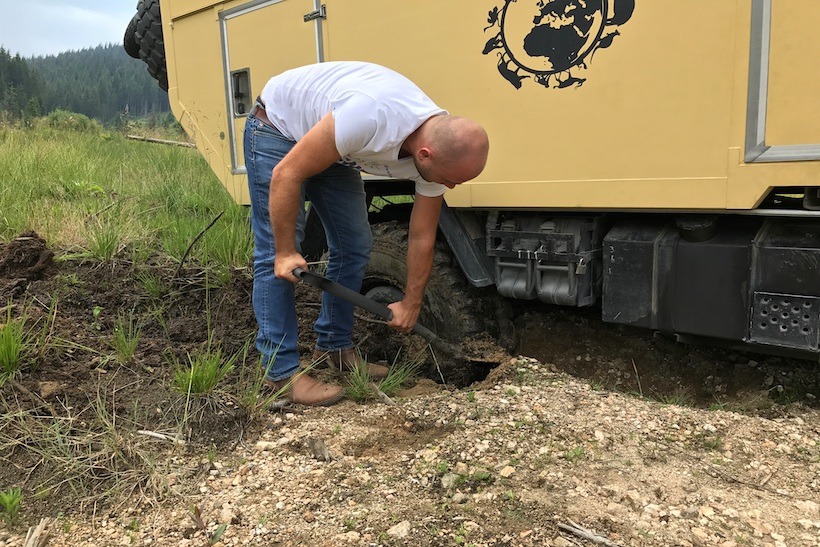
- Hisssssss. You hear another tire leaking; you just had your second flat.
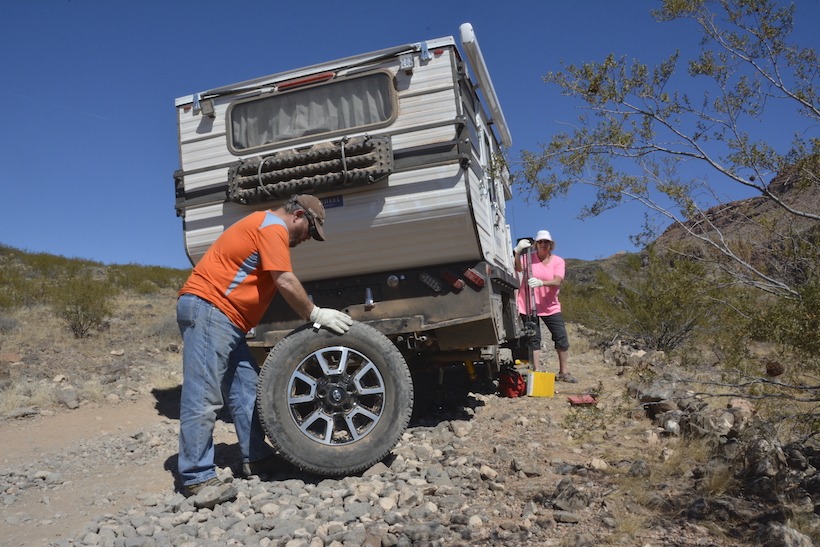
- Your off-road trailer bounces off a large rock during a sharp turn and lands on its side.
- Your 4WD truck is high-centered on a ridge perpendicular to the trail; wheels on both axles are off the ground with no traction.
- While driving an icy route, your vehicle slips sideways, down into a deep rut on the side of the trail and almost tips over. Your wheels have no traction.
- Snow from the middle of the trail has piled up under your vehicle and your forward motion is completely halted.
- You’ve accidentally tipped your vehicle over on its side on a very narrow trail.
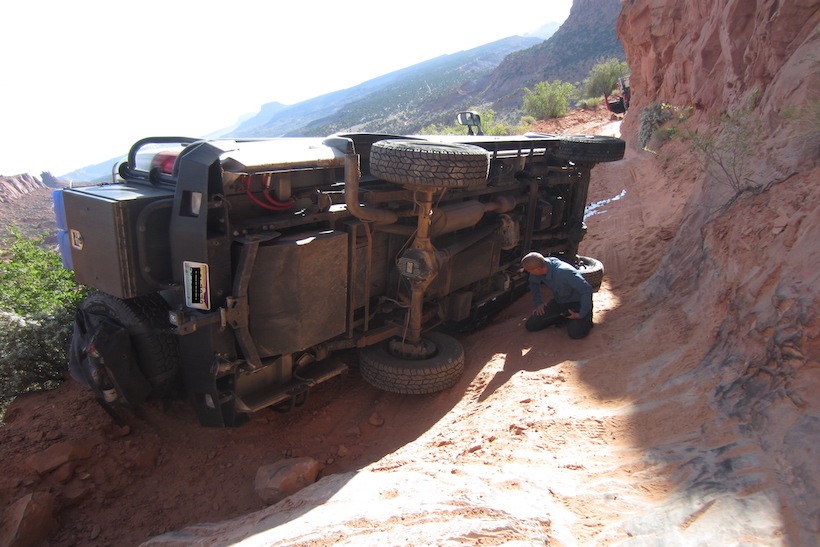
- Your vehicle catches on fire in the remote backcountry.
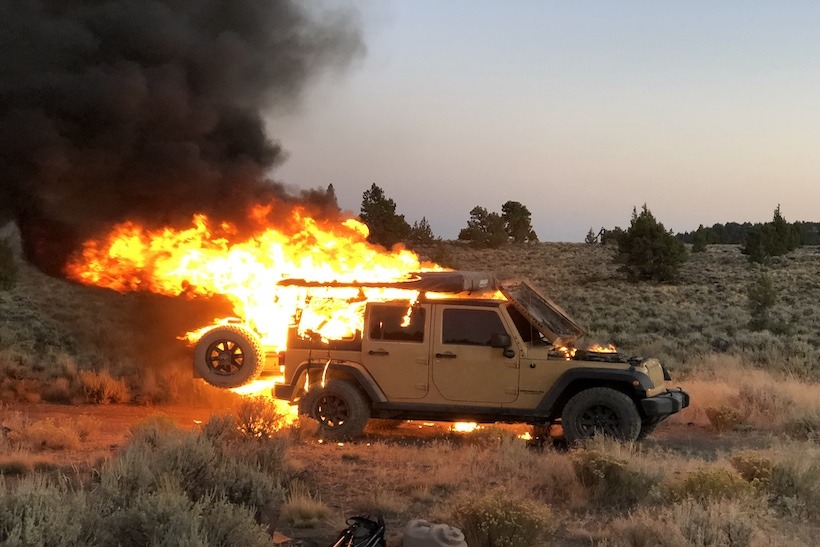
You get the point. Someday, you will get stuck. It happens to everyone. Hopefully when it happens, no one gets hurt. There are thousands of ways off-roaders have their progress terminated or hampered when driving off road.
Let’s be honest. Getting stuck off road is often due to driver error. We all make errors, from the most experienced to the least. Errors can be due to a lack of off-road driving skills. You may misjudge the amount of momentum you need to climb a sandy dune or pick a poor line while traversing a rocky trail. Errors can be due to a lack of knowledge. It’s easier to get stuck when you don’t have a basic knowledge or understanding of your 4WD vehicle or the terrain you are traversing. Errors can also be due to a poor attitude, such as “showing off” in front of peers or performing vehicle maneuvers that defy common sense. I call this a “hold my beer, watch this” mentality. In my opinion, this type of attitude lacks maturity.
Regardless of the reason for getting stuck, it is a part of off-roading. So, if you aren’t thoughtless, cavalier, or alcohol-fueled, there is no real dishonor in getting stuck off road. You will make errors when off-roading or overlanding. Sometimes you get stuck even when you do everything right. There’s no embarrassment in getting stuck if you do all you can to mitigate potential difficulties. Here’s how to lessen backcountry difficulties:
- Take Training from an Expert. Taking formal training from a professional off-road educator can reduce your chances of getting stuck in the remote backcountry. You don’t know what you don’t know. A knowledgeable off-road recovery trainer can teach you all the ways you can avoid getting stuck and what to do when you do.
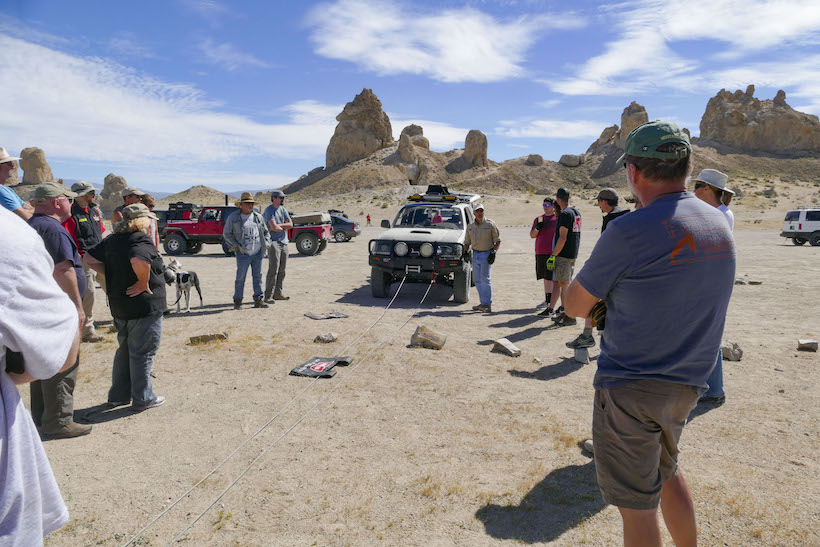
- Venture Within Your Personal Limitations and Abilities. Especially in remote and international settings, you need the proper knowledge, attitude, and skills to problem-solve and get unstuck. Avoid driving a remote trail or section of a trail solo that is beyond the capabilities of both you and your vehicle. If you are solo and reach an extremely challenging section of trail, think about your capabilities. If you decide to attempt the challenging section of trail, plan how you would recover should you get stuck, or the situation worsens.
- Venture Within Your Vehicle’s Capabilities. Not all 4WD vehicles are created equal. Even 4WD vehicles designed from the factory to venture off road have limitations. You will probably get stuck if you push your vehicle beyond its capabilities.
- Know Your Vehicle Intimately. Today’s off-road-specific 4WD vehicles are more complex than in the past. Many have traction-aiding features that should be mastered to get the most from a vehicle. Whether you purchase or build your 4WD, learn how your vehicle functions to avoid getting stuck. To keep from getting stuck, you also need to know intimately your vehicle’s, including lift clearance, articulation capability, and angles (approach, breakover, and departure).
- Travel With Other Vehicles. Recovery efforts are almost always easier and more relaxed mentally when traveling with other vehicles into the remote backcountry. This is especially true when you also are traveling beyond your country of origin and within Third World countries. Having other vehicles along on a journey also widens your recovery options. Now you can use vehicle-assisted off-road recovery methods.
- Have With You and Know How to Use Traction-Aiding Devices. Traction-aiding devices can be built into your vehicle (e.g., lockers, airing down tires, electronic traction control) or taken along with you when you are off-road (e.g., traction boards, shovel). Use as many traction-aiding devices as you have available to completely avoid getting stuck. When you do get stuck, use the same devices to methodically assist you in your recovery efforts.
- Have the Correct Kit, Accessories, or Tools to Get Unstuck. It’s hard to carry every piece of recovery gear with you on every trip. If you’ve researched the trail prior to departure, you should have an idea as to the type of terrain you may need to traverse, helping you bring the right equipment. When with a group of vehicles, you can divide essential equipment between all the vehicles (e.g., not every vehicle may need a heavy Hi-Lift Jack).
- Practice Recovery and Problem-Solving Skills at Home. Practice your skills at home prior to stressful situations in the remote backcountry. Recovery and problem-solving proficiencies are all perishable skills that should be practiced periodically when not under duress.
- Research the Trail You Intend to Drive. Regarding knowledge of a particular trail, get as much accurate information from a qualified source as possible. Keep in mind that trails can change for the worse after one day of intense rainfall or earth movement. In reality, you can never have enough information about a trail. Have several maps that show the trail, as each may tell you something different about the surrounding area and the possible side routes. Before heading out to a trail, try to get current, up-to-date information from other off-roaders and local land-management officials. What’s the water level in streams you need to cross, are there wildfires in the area, what’s the trail’s difficulty rating, what is the typical temperature in the area at the time of use? Answering questions such as these and mining important information can help keep you from getting stuck on a really difficult trail, beyond your capabilities.
- Solve Problems in a Methodical and Effective Manner. When stuck off road, follow an intelligent problem-solving checklist that results in a complete stuck assessment and an effective recovery plan. We will cover this topic in part three of this series in The Adventure Portal.
- Try Low-Energy Methods of Recovery First. As often as possible, first try low-energy and/or saferrecovery techniques (e.g., shovel use, lowering tire pressures, use of traction boards) before trying other, more aggressive and higher energy methods (e.g., kinetic energy, winching) of getting unstuck.
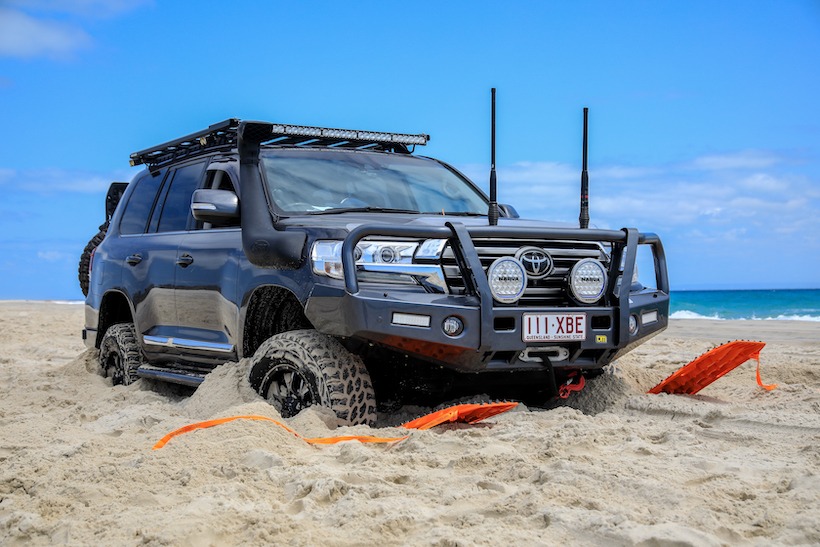
- Refuse to Get Frustrated During Off-Road Recovery Events. When you do get stuck, calm yourself. Stop, Think, Observe, Plan, and then Act.
- Avoid Hurried Recovery Efforts Due to Peer Pressure. Don’t let others on a trail hurry your recovery efforts to get unstuck.
- Safeguard the Environment During Off-Road Recovery Operations. Sometimes getting unstuck in the remote backcountry means disturbing the environment just a bit to get out and going again. A good driver minimizes this disruption as much as possible. In the end, however, you’ll need to do what is necessary to get home alive.
- Use Common Sense. Most of the above points have to do with common sense. Same for the use of drugs or alcohol that may be contrary to safe driving. Use your common sense each and every time you get stuck off road.
- Be Prepared with Survival Knowledge, Skills, and Kit. Should you not be able to recover and get unstuck if you are remote and solo in the backcountry, you need to have the knowledge, skills, and kit to remain comfortable for several hours, a couple of days, or even a week or two should an adventure or work-related incident go bad. The companion Off-Road & Overland Adventure Info Book Live Long to Wander – Basic Survival for Vehicle-Supported Adventures is a must-read for all vehicle-supported adventurers.
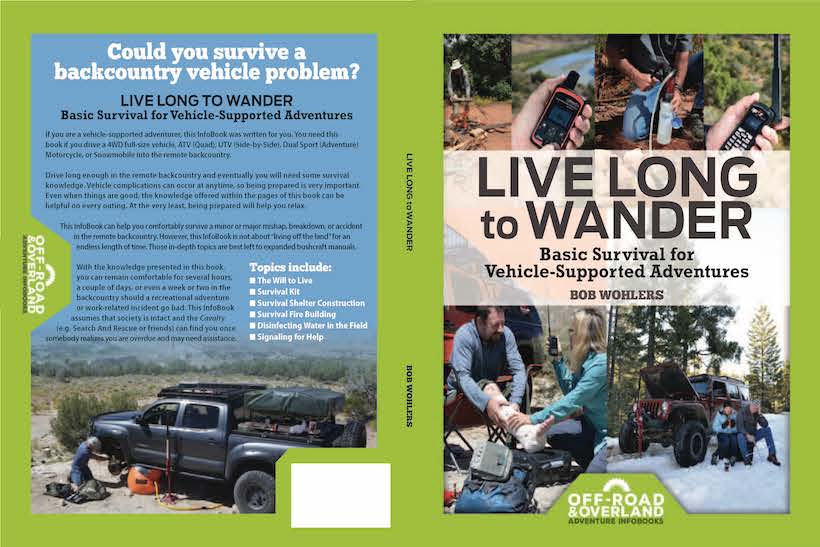
- Live Long to Wander: Basic Survival for Vehicle-Supported Adventures – $25.95 BUY HERE
- Raising Your 4WD Vehicle Off-Road & In-Field Tire Repair – $44.95 BUY HERE
- The Total Approach of Getting Unstuck Off Road – $59.95 BUY HERE
________________________________________________________







